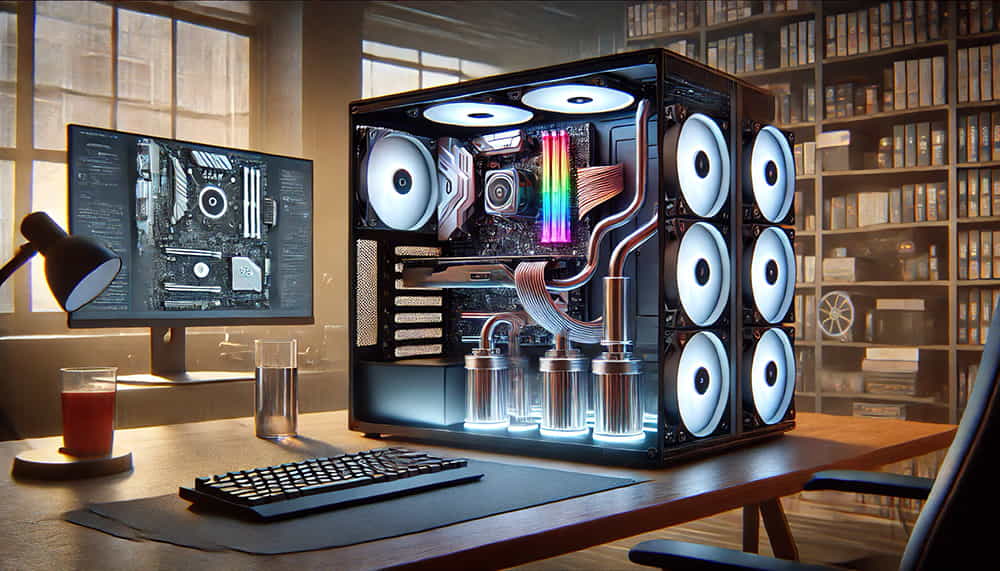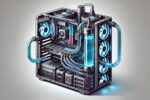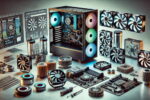Proper cooling of a PC is one of the most important factors in maintaining stable performance and prolonging the life of its components. In 2024, with increasing power demands on processors and graphics cards, the need for an efficient cooling system is greater than ever. This guide will help you understand the importance of good cooling and choose the best system for your computer.
In the following link you can find all the cooling systems we sell.
Importance of Good Cooling in a PC
Cooling not only keeps your PC at an optimal temperature, but also ensures that internal components operate at their maximum capacity without risk. Understanding how heat affects your computer is essential to maintaining its performance and avoiding serious problems.
How Heat Affects Your PC’s Performance
When PC components such as the CPU or GPU overheat, the system activates thermal protection mechanisms to prevent damage. This usually results in a reduction in the clock speed, which significantly decreases the performance of the computer. In addition, excessive heat can cause system instability, leading to crashes, unexpected reboots, or even permanent component failure. Maintaining the proper temperature is essential to take full advantage of your hardware’s potential.
Common Overheating Problems
Overheating is one of the most common problems with poorly cooled PCs. Common signs include:
- Performance degradation due to thermal throttling, which reduces the speed of the CPU or GPU.
- Unexpected shutdowns and automatic restarts, especially during intensive tasks such as gaming or video editing.
- Excessive fan noise, caused by the extra effort fans must make to cool components.
Ignoring these issues can result in irreparable damage to internal components and drastically reduce the lifespan of the PC.
Types of PC Cooling Systems in 2024
There are different cooling systems on the market, and each has its advantages depending on the type of PC and the user’s needs. In 2024, the most common options remain air cooling and liquid cooling.
Air Fans: When to Use Them?
Air cooling is the most traditional and is still effective for most users. Air fans are easy to install, affordable, and in many cases sufficient to maintain an adequate temperature in the PC, especially if you are not overclocking or running very demanding tasks. Modern air cooling systems, such as tower coolers with high-performance fans, are capable of keeping temperatures under control in mid-range and high-end configurations without incurring a large expense.
Liquid Cooling: Advantages and Disadvantages
Liquid cooling has become increasingly popular among enthusiasts and users looking to maximize performance. All-in-One (AIO) liquid cooling solutions offer a combination of high performance and compact design, while custom systems allow for further customization and superior cooling capabilities.
Advantages:
- Higher efficiency in heat transfer, allowing lower temperatures to be maintained even under intense loads.
- Less noise compared to high-speed fans, since water is more effective at moving heat.
Disadvantages:
- High cost compared to air cooling.
- More complex installation and need for additional maintenance, such as checking the fluid level and checking for possible leaks.
How to Choose the Right Cooling System
Choosing the right cooling system for your PC depends on several factors, such as the space available, the type of tasks you perform, and your preferences regarding noise level and maintenance.
Factors to Consider: Space and Power
Before choosing a cooling system, it is essential to consider the space available in the PC case. Large ATX towers are usually compatible with both types of cooling, but smaller cases may limit you to more compact options such as low-profile fans or small-footprint AIO systems.
Additionally, the thermal output of the CPU and GPU should also be considered. High-end processors and powerful graphics cards, such as the NVIDIA RTX 4090 or Intel Core i9, generate more heat and require more efficient cooling systems.
Cooling System Installation and Maintenance
Cooling system installation varies in difficulty. Air fans are generally easier to install and require no aftercare beyond occasional dust cleaning. Liquid cooling, especially custom systems, requires more care during installation and use, including tubing management and periodic leak checking.
For those looking to minimize maintenance, liquid cooling AIOs are a great option, as they come pre-assembled and sealed. However, it’s important to remember that these systems have a limited lifespan, typically around 5 years, before they need to be replaced.
Bottom Line: Optimize Your PC’s Temperature to Improve Durability
In 2024, keeping your PC well-cooled is critical to ensuring stable performance and long component life. Both air and liquid cooling have their advantages and disadvantages, and the choice depends on your specific needs and available budget. If you want a simple and reliable system, air cooling is sufficient for most setups. On the other hand, if you are looking to maximize performance and reduce noise, liquid cooling may be the best option. Whatever your choice, maintaining a proper temperature in your PC will help prevent overheating problems, improve performance, and extend the lifespan of your rig.







